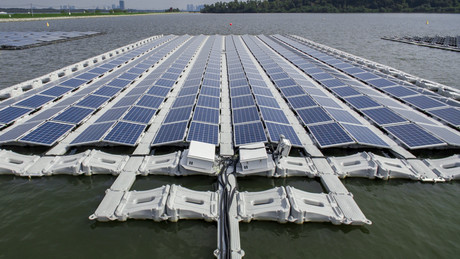World's largest floating photovoltaic power plant test-bed

Land scarcity has severely limited Singapore’s adoption of solar power. Floating solar panels may be a viable alternative for the city-state surrounded by water. Floating panels could also be 11% more efficient than solar panels placed on precious land. ABB is providing critical components on a landmark one-megawatt floating solar photovoltaic test bed measuring 1 hectare in size. The energy generated will be fed into the national energy grid, providing electricity for up to 250 households.
“We are proud to support this important project in Singapore with our technological expertise and domain knowledge,” said Tarak Mehta, president of ABB’s Electrification Products division. “This project is perfectly aligned with our Next Level strategy around the energy revolution and is an important step in collaborating with partners to bring more renewables into the future energy mix.”
Located in the Tengeh Reservoir in west Singapore, the installation features multiple solar solutions from providers to study the performance and cost-effectiveness of floating solar platforms. ABB supplied 100 kW of TRIO-50 solar inverters to Phoenix Solar, one of several system integrators for the project. These components convert the direct current produced in solar panels into alternating current for use in electrical grids. Additionally, ABB low-voltage moulded case and miniature circuit breakers protect the electrical circuits on the water.
In Singapore — a country with an area of only 719 km2 and a population of 5.6 million — high average annual solar irradiation of about 1500 kWh/m2 makes solar an attractive source of renewable energy. Floating solar platforms will be naturally cooled by the surrounding water, which increases the efficiency of the energy yields significantly. A study has found that the natural cooling effect of the water beneath the solar cells makes them up to 11% more efficient than solar panels placed on land. In a synergistic effect, the floating platform helps reduce evaporation of the valuable water.
New research dedicated to sustainable and resilient supply chains
The University of Adelaide's new research centre will focus on the transformation of...
Australia's engineering skills gap is double global average
Australia named fourth-highest payer globally as gap continues to grow.
Recyclable circuit board turns to jelly for disassembly
Researchers have developed a new PCB that performs on par with traditional materials and can be...














